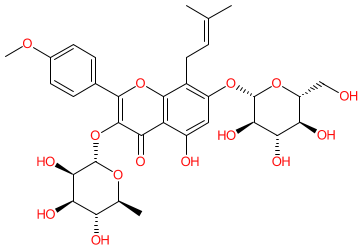GtoPdb is requesting financial support from commercial users. Please see our sustainability page for more information.
|
Compound class:
Natural product
Comment: Icariin is a plant-derived flavonoid (from Epimedium species). It is reported to exert neuroprotective and antiaging effects. Through inhibition of phosphodiesterase 5 (PDE5) and SIRT1 it is proposed to mediate a reduction of Aβ production and pathogenesis that translate to improved neuronal survival and function [1-2,4]. Synthetic icariin derivatives with potency similar to that of sildenafil have been described [3].
Ligand Activity Visualisation ChartsThese are box plot that provide a unique visualisation, summarising all the activity data for a ligand taken from ChEMBL and GtoPdb across multiple targets and species. Click on a plot to see the median, interquartile range, low and high data points. A value of zero indicates that no data are available. A separate chart is created for each target, and where possible the algorithm tries to merge ChEMBL and GtoPdb targets by matching them on name and UniProt accession, for each available species. However, please note that inconsistency in naming of targets may lead to data for the same target being reported across multiple charts. ✖ |
|
|||||||||||||||||||||||||||||||||||
| References |
|
1. Anand Ganapathy A, Hari Priya VM, Kumaran A. (2021)
Medicinal plants as a potential source of Phosphodiesterase-5 inhibitors: A review. J Ethnopharmacol, 267: 113536. [PMID:33137431] |
|
2. Chuang Y, Van I, Zhao Y, Xu Y. (2021)
Icariin ameliorate Alzheimer's disease by influencing SIRT1 and inhibiting Aβ cascade pathogenesis. J Chem Neuroanat, 117: 102014. [PMID:34407393] |
|
3. Dell'Agli M, Galli GV, Dal Cero E, Belluti F, Matera R, Zironi E, Pagliuca G, Bosisio E. (2008)
Potent inhibition of human phosphodiesterase-5 by icariin derivatives. J Nat Prod, 71 (9): 1513-7. [PMID:18778098] |
|
4. Jin F, Gong QH, Xu YS, Wang LN, Jin H, Li F, Li LS, Ma YM, Shi JS. (2014)
Icariin, a phosphodiesterase-5 inhibitor, improves learning and memory in APP/PS1 transgenic mice by stimulation of NO/cGMP signalling. Int J Neuropsychopharmacol, 17 (6): 871-81. [PMID:24513083] |






